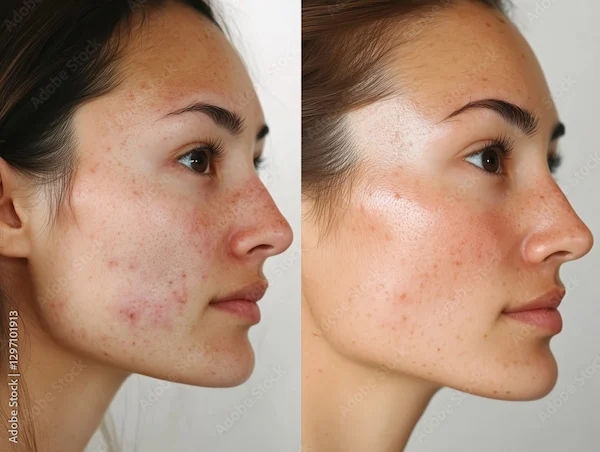How To Reduce Sweating On Face?
Explore proven ways to reduce facial sweating with natural remedies, skincare, and lifestyle changes. Discover how dietary adjustments, hydration, and stress management boost confidence and deliver a comfortable, sweat-free life.

Written by
Last updated on 3rd Jul, 2025
Excessive and uncontrolled sweating on the face is medically termed craniofacial hyperhidrosis. This can be extremely challenging as well as embarrassing for individuals dealing with this condition. Understanding and solving the underlying causes of chronic facial sweating can improve their day-to-day life as well as boost their confidence.
In this comprehensive guide, we will explore the reasons behind facial sweating, examine dietary and lifestyle triggers, and discuss a range of remedies to help manage and reduce sweating on the face.
Understanding Facial Sweating
Facial sweating occurs when sweat glands in the face release perspiration in response to heat, physical exertion, or emotional stimuli. While sweating is a normal part of the body's cooling system, excessive sweating—known as craniofacial hyperhidrosis—can be challenging and impact social interactions.
1. Causes of Excessive Facial Sweating
Excessive facial sweating may stem from several sources:
Hyperhidrosis: A condition where the body produces more sweat than necessary for temperature regulation.
Anxiety and Stress: Emotional responses can trigger the release of stress hormones, leading to increased sweating.
Dietary Influences: Certain foods and beverages may act as triggers.
Environmental Factors: Hot weather, humidity, and exposure to high temperatures can exacerbate sweating.
Medical Conditions: Disorders like hyperthyroidism or diabetes might also play a role.
2. Dietary Factors That Trigger Sweating
Our bodies and their functions are deeply interlinked. So it comes as no surprise that the amount one sweats is directly linked to their dietary habits. Food and drink substances that are high in caffeine content, spicy and contain alcohol are well-known triggers. As was previously mentioned food items rich in capsaicin such as chillies or peppers can elevate the body temperature thereby inducing sweat. Similarly, beverages such as coffee and tea can stimulate the nervous system, leading to increased perspiration. Monitoring diet and identifying any correlations between certain foods and sweating patterns may help adjust consumption accordingly.
3. Environmental and Lifestyle Triggers
Beyond diet, several lifestyle and environmental factors can contribute to facial sweating:
Weather Conditions: High temperatures and humidity levels often lead to more pronounced sweating.
Stressful Situations: Anxiety, social stress, or even public speaking can stimulate the sweat glands.
Physical Activity: Exercise and physical exertion naturally increase body temperature and cause sweating.
Medical Conditions Associated with Excessive Sweating
While occasional sweating is normal, excessive sweating can be a cause for concern. Two common conditions include:
Hyperhidrosis
Hyperhidrosis is a chronic condition where people sweat excessively and without exerting themselves. With hyperhidrosis, the palms, underarms, and face tend to sweat even when it is cool. This condition is mainly hereditary and often needs targeted treatments beyond conventional antiperspirants.
Anxiety and Stress
Emotional or psychological elements can incite somebody to sweat. When stressed or anxious, adrenaline is released which activates the sweat glands. This can result in visible sweating, particularly on the face. Knowing how to manage stress is just as important as dealing with the physical signs of stress.
Home Remedies for Reducing Facial Sweating
For many, home remedies offer a first line of defence against excessive facial sweating. Incorporating a blend of effective skincare, natural remedies, and over-the-counter products can yield significant improvements.
1. Effective Skin Care Practices
A consistent skincare routine tailored to sensitive, sweaty skin can help. Here are a few tips:
Gentle Cleansing: Use a mild, non-comedogenic cleanser twice daily to remove excess oil and impurities without stripping the skin’s natural moisture.
Moisturising: Even if the skin tends to be oily, a lightweight, oil-free moisturiser can help maintain the skin barrier.
Cooling Products: Consider using gels or lotions that have a cooling effect, especially during the warmer months.
2. Use of Natural Remedies
Many natural ingredients are believed to reduce sweating:
Witch Hazel: Known for its astringent properties, witch hazel can help tighten the skin and reduce sweat production.
Tea Tree Oil: Its antibacterial properties can help keep the skin clear, reducing the risk of sweat-induced breakouts.
Apple Cider Vinegar: Diluted apple cider vinegar applied with a cotton ball can help balance the skin’s pH and act as a natural antiperspirant.
Over-the-Counter Solutions to Manage Facial Sweating
Pharmacies offer a variety of over-the-counter products designed to manage excessive sweating. Look for products that are specifically formulated for facial use:
Antiperspirants for Facial Use: Specially formulated products can help control sweat without irritating the delicate skin on the face. These often contain aluminium chloride, which works by blocking the sweat ducts.
Powders and Sweat-Absorbing Products: Facial powders can absorb excess moisture throughout the day, keeping skin dry and reducing shine.
Medical Treatments for Excessive Sweating
When home remedies and over-the-counter solutions are insufficient, medical treatments may be necessary. Consulting a healthcare professional is essential to determine the best course of action for your particular condition. They may prescribe:
Prescription Antiperspirants
For cases of severe hyperhidrosis, doctors may prescribe stronger antiperspirants containing higher concentrations of active ingredients like aluminium chloride hexahydrate. These products require careful application as they are more potent than their over-the-counter counterparts.
Botulinum Toxin Injections (Botox)
Botox injections are a well-known treatment for hyperhidrosis. By blocking the nerves that trigger sweat production, Botox can significantly reduce facial sweating for several months at a time. Although the treatment may be costly and requires repeat sessions, many find it an effective long-term solution.
Other Medical Treatments
In some instances, oral medications that reduce overall sweat production or iontophoresis—a treatment that uses electrical currents to reduce sweat gland activity—may be recommended.
Lifestyle Changes to Manage Sweating
Making targeted lifestyle adjustments can also help mitigate facial sweating. These changes not only address the physical aspect of sweating but can also reduce associated stress and anxiety.
Adjust your diet by avoiding trigger foods like spicy dishes, caffeine, and alcohol.
Consume a balanced diet with plenty of fruits, vegetables, and lean proteins.
Stay well-hydrated by drinking plenty of water to help regulate your body temperature.
Manage stress by practising mindfulness, meditation, and regular moderate exercise.
Ensure you get adequate sleep to support both mental and physical well-being.
When to Seek Professional Help?
While many cases of facial sweating can be managed with home remedies and lifestyle changes, there are situations when professional help is essential.
1. Signs That Require Medical Attention
It is important to see a doctor when there is an increase in facial sweating. Other symptoms like involuntary weight loss, fever, and heart palpitations are alarming signs too. These are possible signs of underlying health issues that may require urgent attention.
2. Consulting a Dermatologist or Healthcare Provider
For people with excess sweating, a dermatologist can provide guidance on the most effective treatment. They can help determine the reason for the sweating and tell whether it is primary hyperhidrosis or sweating due to other medical conditions. With that, they can also help curate a personalised and effective treatment plan.
Conclusion
Excessive facial sweating can be managed with the right approach. Understanding its causes and using home remedies, lifestyle changes, and professional treatments can significantly reduce sweating. Combine a balanced diet, proper hydration, and stress management with targeted skincare, and seek medical advice if needed to boost your confidence and enjoy a more comfortable, sweat-free life.
Consult Top Dermatologist
Consult Top Dermatologist

Dr. Anushtha Tomar
Dermatologist
10 Years • Md( Dermatology, Venereology, Leprosy )
Indore
Apollo Hospitals Vijay Nagar, Indore

Dr. S Madhuri
Dermatologist
10 Years • MBBS, MD. DVL, DNB, Fellow (Dermatosurgery & Lasers)
Secunderabad
Apollo Hospitals Secunderabad, Secunderabad
(300+ Patients)

Dr. Aishwarya Malladi
Dermatologist
3 Years • MBBS, MD (Dermatology)
Chinagadila
Apollo Hospitals Health City Unit, Chinagadila
(100+ Patients)

Dr. Benugopal Mohapatra
Dermatologist
9 Years • MBBS, DNB (Derm, Ven & Lep)
Kolkata
arati medical and polyclinic, Kolkata

Dr. Punam De
Dermatologist
10 Years • MBBS, MD, DVL
Kolkata
PUNAM'S GORGEOUS YOU, Kolkata
(650+ Patients)

